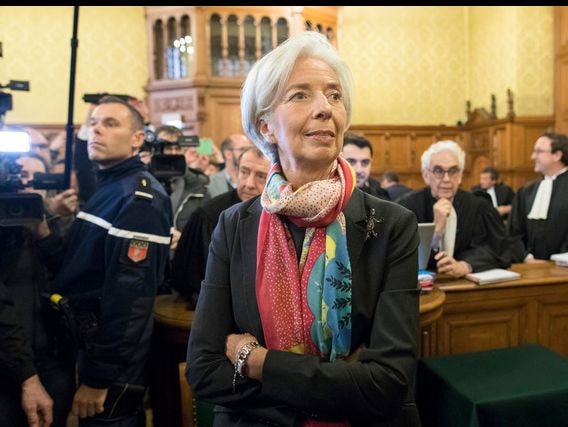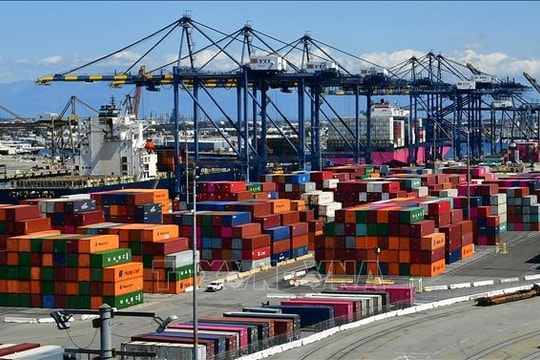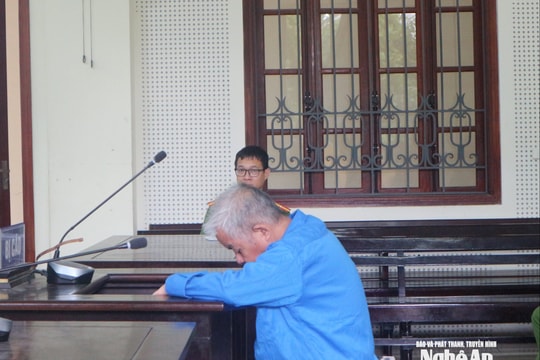IMF 'boss' guilty but not punished
(Baonghean) - After a lengthy investigation and trial, the French Court of Justice has finally determined that International Monetary Fund (IMF) Managing Director Christine Lagarde was guilty of "negligence" during her time as French Finance Minister.
It is worth mentioning that although convicted, Ms. Lagarde did not face any punishment. Will this “escape route” help her maintain her position as the most powerful woman holding the “money bag” of the world?
Past mistakes
In fact, Ms. Lagarde’s involvement in a decades-long legal case has been known since she was elected Managing Director of the IMF in June 2011, replacing Dominique Strauss-Kahn. It happened when Ms. Lagarde was French Finance Minister and was ordered to oversee the adjudication of a politically charged case.
The case dates back to the 1990s, when business tycoon Bernard Tapie, a close friend of former President Nicolas Sarkozy and a major shareholder of sportswear company Adidas, filed a lawsuit against French state-owned bank Credit Lyonnais, claiming that the bank had deliberately lowered the price when he had to sell the company.
By 2007, the long-running case was sent to Ms. Lagarde’s Arbitration Commission. The three-member arbitration panel awarded Mr. Taipei $417 million in 2008. This decision was considered a conflict of public and private interests and caused public reactions.
 |
| IMF Managing Director Lagarde attends a court hearing in France. Photo: Bloomberg |
Not long after, Ms. Lagarde's advisers advised her to appeal the decision of the Arbitration Commission, but she did not, thus public opinion began to "scrutinize" her role in the compensation case.
After many rounds of investigation and trial, on December 19, the French Court of Justice concluded that Ms. Christine Lagarde was guilty of “negligence,” but she will not face any punishment. For her part, from beginning to end, Lagarde defended herself that she always acted in good faith and without any selfish interests.
Guilty but not paying the price
Legal experts had previously said that if convicted, Ms. Lagarde would face at least a year in prison and a large fine. However, the court's decision is understandable. If sentenced to prison, Ms. Lagarde would have to give up her powerful seat at the IMF.
Of course, this is not only a “black mark” on Ms. Lagarde personally but also on the image of France. If the case is not resolved to the end, it will not be able to satisfy public opinion.
Since the revelation of evidence linking Ms. Lagarde to the Tapie compensation case, the French public has been outraged by corruption at the top level, demanding that the close relationships between politicians and businessmen, and the large sums of money used to “grease” the wheels of politics, be brought to light.
Therefore, the “guilty but not guilty” approach can solve the dilemma that the executive and judiciary face. Explaining the legitimacy of the sentence, according to Judge Martine Ract Madoux, they “took into account the context of the global financial crisis when Ms. Lagarde got into trouble.”
In addition, Ms. Lagarde's good reputation and international standing are also among the reasons. However, the guilty verdict also makes many people question whether Lagarde's "seat" at the IMF is shaky.
In fact, the fund’s board, which has supported Ms Lagarde throughout the case, met after the ruling and “reaffirmed their full confidence” in her abilities.
This shows that the IMF does not want a personnel crisis like 5 years ago and thus, Ms. Lagarde may have "escaped"!
The bravery of the "steel rose"
Always appearing in public with an elegant and “fashionable” appearance, she wears French designers, Chanel clothes, Hermès scarves with pretty bracelets and fur-lined coats. But those are not the most attractive points of the “boss” of the IMF.
She won people's sympathy thanks to her eloquence, her ability to handle any problem, no matter how difficult, and her tireless efforts at work. She once told a French newspaper: "Success never stops. It is an endless battle. Every morning, one must put one's abilities to the test again."
Lagarde once revealed that, in addition to her interest in financial control, she also loves roses. Therefore, she was once called the "steel rose". In 2011, she was elected head of the IMF and became the first female Managing Director of the IMF in the organization's more than 60-year history.
 |
| Lagarde is always welcome at important financial conferences. Photo: Reuters |
Objectively, now is the time when the IMF really needs a leader as quick and decisive as Ms. Lagarde. After the French Court's verdict, the Financial Times (UK) commented, "The IMF cannot afford to lose Lagarde", her trial is simply a way to "tease" future French politicians.
In fact, since taking office, Ms. Lagarde has made many contributions to this major financial institution. She has played a key role in the IMF's rescue of countries on the brink of collapse such as Greece and Ukraine. US Treasury Secretary Jack Lew called Lagarde a "strong leader" and "confident in her ability to lead the IMF at a critical time for the global economy."
The IMF is currently facing many challenges as the wave of protectionism is growing. How to promote the benefits of trade and globalization, as well as apply policies to fight inequality, is a headache for those holding international "money baskets".
In addition, the election of billionaire Donald Trump as US President also raises many big questions about the future of international financial institutions. In such a context, the IMF cannot afford to lose a leader who is considered to have the “ability to resolve conflicts” and “influence on many countries” like Ms. Lagarde.
Thanh Huyen
| RELATED NEWS |
|---|



.jpg)



